Key takeaways
- The Corporate Sustainability Due Diligence Directive (CSDDD) is an EU law requiring companies to identify and address human rights and environmental risks in their supply chains.
- Although the directive targets large companies, small and medium-sized businesses (SMEs) will also be affected — especially those supplying to larger firms.
- SMEs may be asked to show proof of ethical sourcing, formalise policies, and adopt traceability tools to stay competitive.
- Early action and better supply chain visibility can help SMEs build trust, meet client expectations, and prepare for future regulatory requirements.
With the Corporate Sustainability Due Diligence Directive (otherwise known as the CSDDD) just around the corner, European businesses are taking a fine-tooth comb to the inner workings of their own operations, as well as those of their subsidiaries and – importantly – their suppliers. While the legislation does not directly apply to small and medium-sized businesses, the CSDDD’s supporting measures mean you’re likely to feel its impact too.
In this article, we’ll break down the CSDDD by defining exactly what it is, what it could mean for your business, and what you can do to prepare for regulatory compliance.
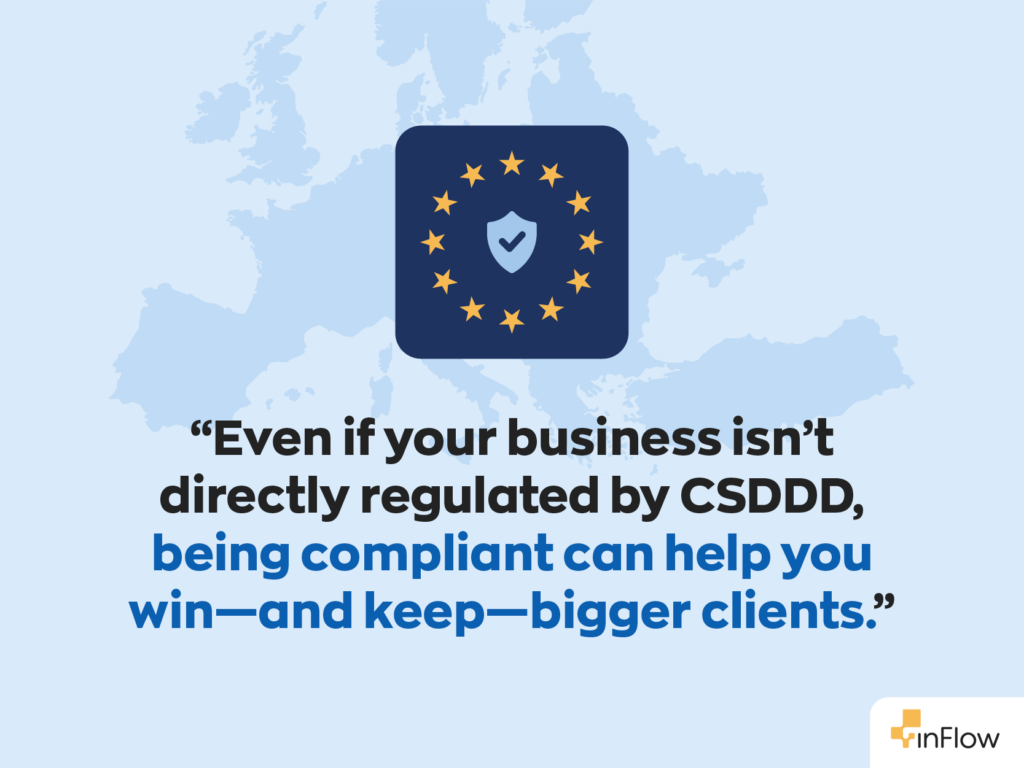
What is the Corporate Sustainability Due Diligence Directive?
Essentially, it’s a directive in EU law that requires companies to conduct appropriate human rights and environmental due diligence across their supply chains. But here’s what makes it unique. The CSDDD goes above and beyond any regulatory directive that’s come before because it applies to a company’s entire supply chain, which includes both its upstream and downstream activities. This will have far-reaching effects both within Europe and across the globe, as companies reshuffle their operations and realign business partnerships to ensure compliance.
What are the CSDDD requirements?
The CSDDD, formally adopted on July 25, 2024, will hold companies accountable for their impact on people and the planet. This requires businesses to take meaningful action regarding human rights and environmental protection. Not just make empty promises. Under the directive, companies must integrate responsible practices into their day-to-day operations. They need to actively look for risks in their supply chains that could harm people or the environment. From there, they need to take steps to prevent or fix any problems they find, and regularly assess whether those measures are working. They’re also expected to communicate openly about their efforts and provide support or remedies if harm has occurred.
Who needs to comply and by when?
Although the EU has already adopted the legislation, the full rollout will happen gradually. This is because EU member states first need to move the directive into national law before companies are required to comply. And each member state has until July 26, 2026, to do so. From there, the CSDDD will first apply to the largest companies:
- Companies with 5,000+ employees and a net global turnover of €1.5 billion or more must comply by the end of July 2028.
- Companies with 3,000+ employees and a net global turnover of €900 million or more must comply by the end of July 2029.
- Companies with 1,000+ employees and a net global turnover of €450 million or more must comply by the end of July 2030.
The legislation will also apply to non-EU companies doing business in the EU, provided they earn more than €450 million in annual turnover within the EU. The only difference is that employee numbers don’t count towards compliance for these companies. Here’s a breakdown of the requirements:
- Non-EU companies that generate a net turnover of more than €1.5 billion in the EU in the last financial year preceding July 26, 2028, must comply by the end of July 2028.
- Non-EU companies that generate a net turnover of more than €900 million in the EU in the last financial year preceding July 26, 2029, must comply by the end of July 2029.
- Non-EU companies that generate a net worldwide turnover of more than €450 million in the EU in the last financial year preceding July 26, 2030, must comply by the end of July 2030.
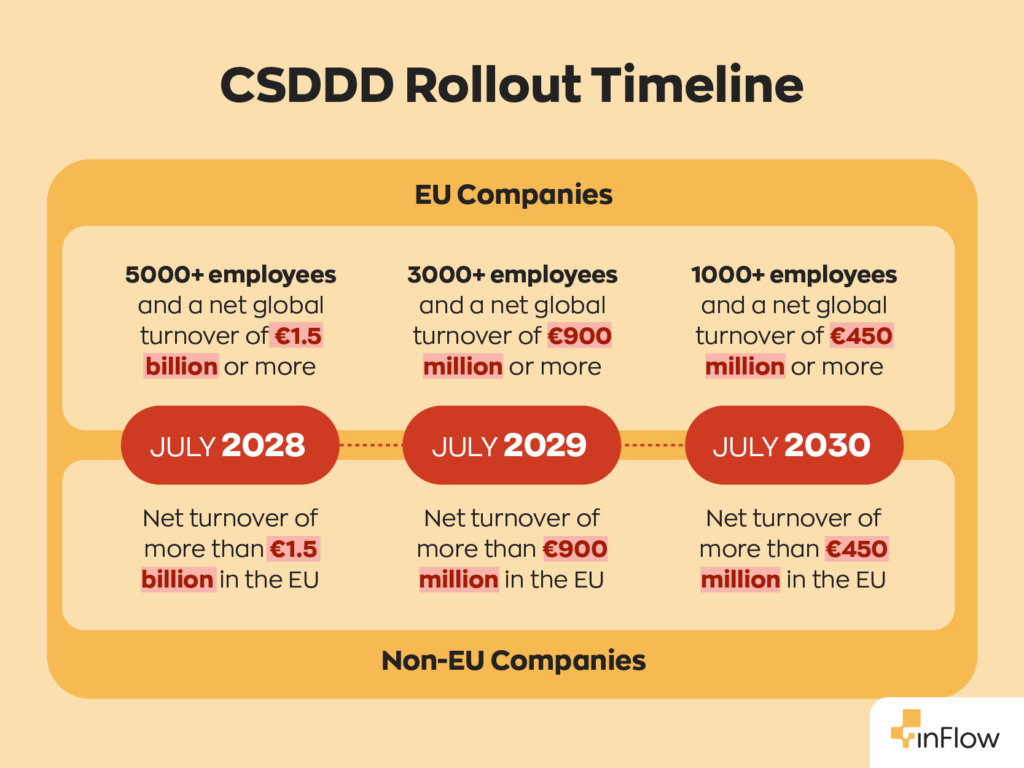
How is the CSDDD different from laws that already exist?
While several EU laws are already in place — such as those covering deforestation, conflict minerals, and battery production — the CSDDD goes a step further by not just encouraging action, but legally requiring it. It creates clear rules that companies must follow to remain compliant. For example, the CSDDD works alongside the Corporate Sustainability Reporting Directive (CSRD), which focuses on transparency through ESG reporting. Together, they create a legal framework that ensures companies not only report on issues but actually take steps to address them.
The CSDDD will also help create a more consistent, EU-wide approach to supply chain responsibility. It builds on international standards such as the UN Guiding Principles and OECD Guidelines. It supports the EU’s broader sustainability goals, including those outlined in the EU taxonomy (a set of rules that helps define which business activities are truly sustainable). By requiring companies to do their due diligence, the directive ensures that environmental and human rights considerations are central to supply chain policies across all member states.
In essence, as this directive rolls out, it’s expected to influence and expand on pre-existing national laws — like Germany’s Supply Chain Act and France’s loi de vigilance — and set the tone for new global standards of supply chain responsibility.
What does the CSDDD mean for my small or medium-sized business?
The directive mainly aims at large companies, but it will still have a clear impact on small and medium-sized businesses. Especially those that supply goods or services to larger firms.
Big companies covered by the directive will be responsible for making sure their entire supply chain follows environmental and human rights standards. As a result, SMEs will likely need to show proof of ethical sourcing, provide sustainability documentation, and introduce basic due diligence practices. This means you can expect more transparency and accountability from businesses at every level of the supply chain.
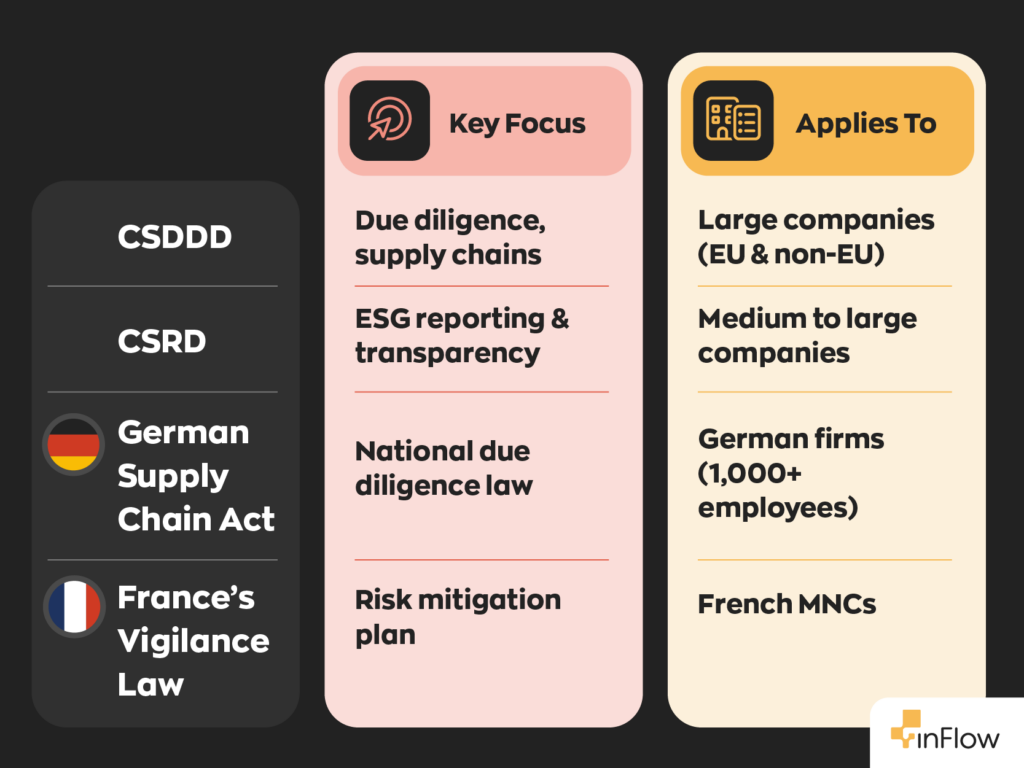
Even if not directly regulated by the CSDDD, many SMEs will still need to formalise policies on working conditions, environmental responsibility, and supplier relationships. This could lead to more administrative work, but it’s also becoming necessary for businesses wanting to retain contracts or win new ones with larger, sustainability-focused clients.
At the same time, early action can be a real advantage. SMEs that currently align with CSDDD principles can position themselves as trustworthy, future-ready partners. This opens up new opportunities and builds stronger, long-term relationships with key customers.
How can I ensure CSDDD compliance?
To support these changes, many SMEs may need to adopt tools that offer better traceability. Systems like inventory or supply chain management software can help businesses track product origins, store supplier data, and monitor risk. Essentially, they make compliance more manageable. For small and medium-sized businesses looking to stay competitive and compliant, this might feel overwhelming. That’s where tools like inFlow’s inventory management system (IMS) can help. With features like barcode scanning, inventory tracking, alerts, and reporting, businesses can strengthen traceability and take meaningful steps towards responsible supply chain practices.
Traceability of goods
The CSDDD calls for clear visibility across the supply chain. This is where barcodes become incredibly powerful. With inFlow’s barcode scanning and inventory tracking features, businesses can monitor the movement of raw materials, components, and finished goods from origin to delivery. This level of traceability helps companies identify supply chain risks and ensure they handle stock responsibly. For SMEs, it can reduce operational risk and build trust with larger partners that must meet CSDDD requirements.
Monitoring and alerts
Being proactive is key to compliance. With inFlow’s alert features, businesses can track important stock changes and disruptions in real time. This helps teams respond quickly to issues — adjusting procurement plans or reviewing inventory levels — so potential supply chain problems don’t go unnoticed.
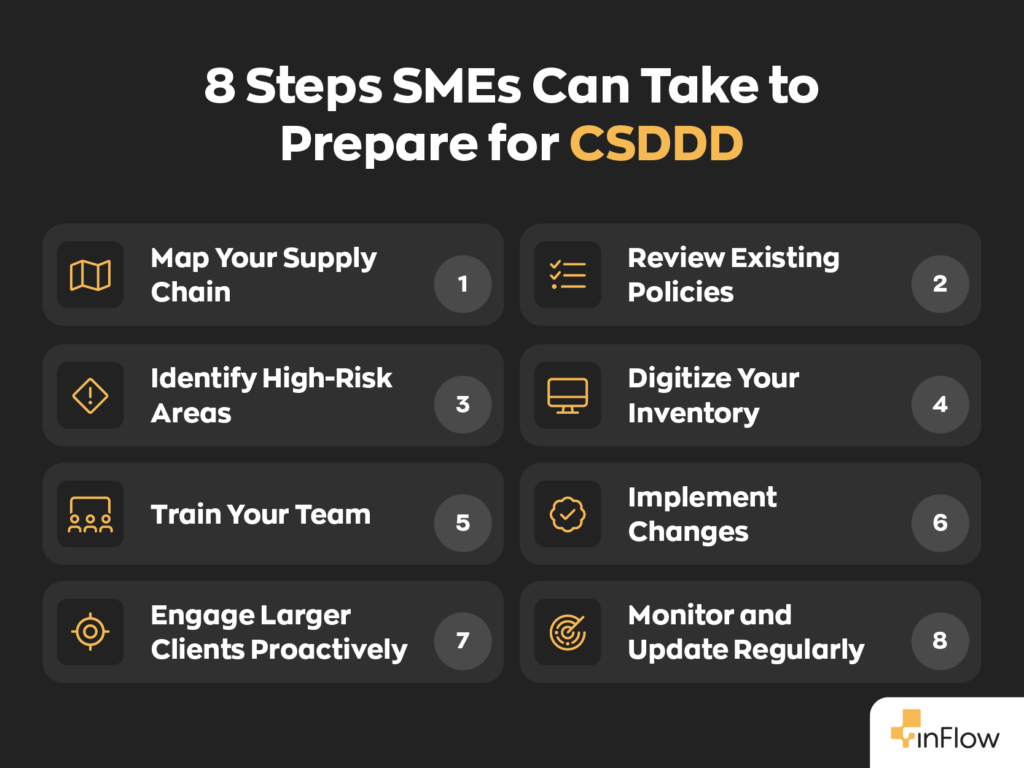
Inventory reporting
CSDDD readiness also means having clear, accessible data. inFlow’s reporting tools allow businesses to track key inventory metrics and generate structured reports. These reports can support transparency efforts and simplify internal reviews, giving SMEs a clearer view of how goods move through their operations.
Conclusion
The CSDDD marks a major shift in how companies should operate. It brings sustainability and human rights from the periphery to the core of business decision-making. And while it’s mainly aimed at larger organizations, its ripple effects will undoubtedly be felt by SMEs, especially those working within global supply chains. Whether you’re supplying materials, manufacturing goods, or simply managing stock, expectations around traceability, accountability, and transparency will only grow.
The good news? You don’t have to tackle it all at once – or alone. Taking early steps to organize your processes, strengthen supply chain visibility, and adopt the right tools positions you to meet new requirements and stand out as a responsible, forward-thinking partner. Solutions like inFlow can help make that transition smoother by giving you better control over what’s coming in, what’s going out, and where it’s all going. That way, you can focus on what really matters: growing your business while doing the right thing.

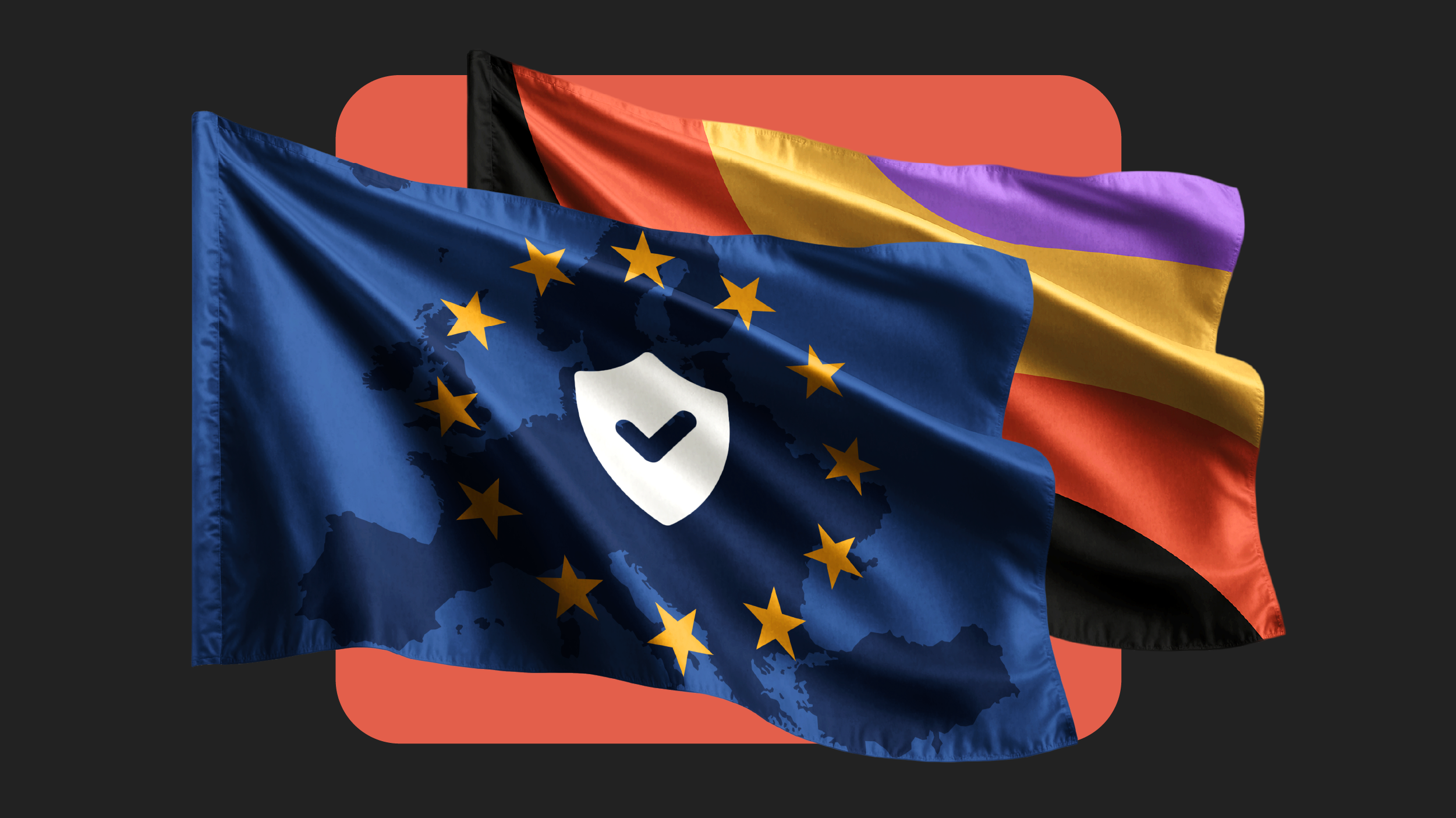



0 Comments